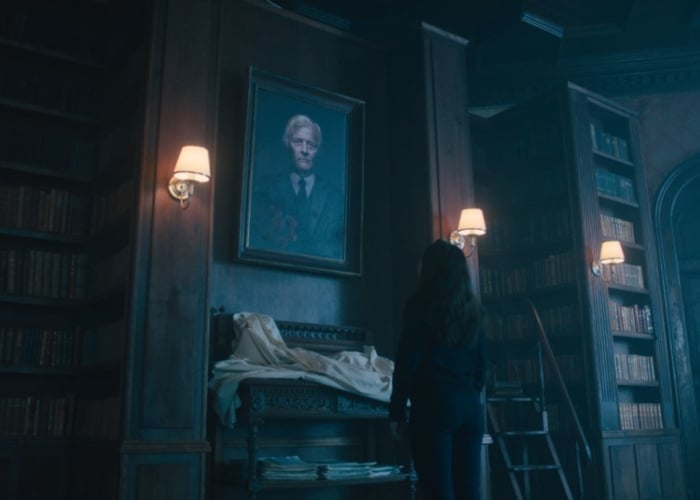
It’s not every day someone sets themselves ablaze, but that’s just what happens at the start of The Sonata as we watch a man add some final notes to a piece of music before stepping outside, dousing himself in flammable liquid, and then lighting himself on fire. It’s one hell of a cold open, but soon enough we’re introduced to Rose Fisher (Freya Tingley), a young, intensely talented violinist on the edge of either success or obsolescence. She receives word that she’s the sole heir to the estate of her legendary recluse of a father, the recently burned to death Richard Marlowe (Rutger Hauer), and immediately sets off for her new estate in rural France. Visions and feelings collide to reveal clues to her true inheritance, though, and with the help of her recently fired manager Charles (Simon Abkarian), she soon discovers one last musical work of her father’s that’s demanding to be heard.
A woman at risk, a mysterious inheritance, a castle-like home devoid of life but living all the same — The Sonata incorporates multiple elements from past Gothic chillers, and what the results lack in originality they more than make up for in style and atmosphere. Director Andrew Desmond crafts an effectively moody slow-burn about a piece of art that holds the key to the door between this world and… somewhere else. It’s all about the tone, and while the pieces fall expectedly into place they do so with increasingly ominous intent and the sound of piano keys playing you offstage towards hell.
Hauer is the big name here, but as one of the legend’s final films his presence is perhaps fittingly — and hauntingly — that of a man who we truly only see after passing. Images, paintings, and a brief recording cast him as an ethereal presence amid the revelations and reveals, and it works like gangbusters as he suggests a man entrenched in a darkness he didn’t quite fully understand.
The film’s true leads both do good work as players equally out of their league with the artistic endeavor beckoning them. Tingley captures the spoiled nature of young, acclaimed talent well, and her character’s stubborn nature leads her to resist the danger at first. As truths become clearer, though, her Rose struggles to find the honest courage within that’s been perhaps absent in her music. Abkarian, meanwhile, brings an engaging desperation to a man longing for a big break, and the closer he gets to the meaning behind Marlowe’s final sonata the more precarious his intentions grow.
Desmond moves his film between the two as they work independently to find answers to their many questions, and while the big picture seems fairly clear to genre fans the individual beats work well to build atmosphere and tension. Puzzles reveal clues in the house, and Rose’s psyche leads her to remnants of horrible deeds, and all of it works well to shape a growing dread around Marlowe’s sonata. Well the main conflict seems to be with the threat of something evil, the battle of wills between these two powers as much of the film’s drama and plays into third-act choices. We have a sense what to expect as the film moves towards its finale and the piece is played, but after the unsettling yet low-key build-up the film still manages some chilling imagery and revelation.
From the ghostly castle interior to the fog-shrouded woods surrounding the estate and hiding secrets of their own, cinematographer Janis Eglitis captures the otherwise normal environments with an eye for the unnerving, and composer Alexis Maingaud works to create a score that, while not raising hell, still succeeds at pairing beauty and uncertainty.
The Sonata features a simple setup and feel more akin to a classic Hammer film than most of today’s genre cinema, but the necessary notes are present and played with talent resulting in a chiller that delivers the goods. This isn’t horror designed to leave audiences screaming, but it’s more than suitable for watching alone at night.
Related Topics: Horror, Rutger Hauer, The Sonata
